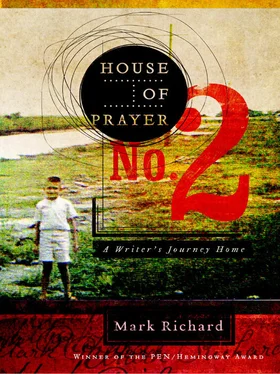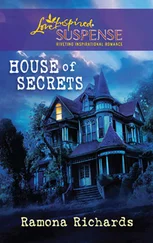AND SO IT COMES TO PASS that seven years later you find yourself sitting in a hard wooden pew in a tiny whitewashed cinder-block church in winter with little heat, the one toilet is clogged, there’s an outhouse out back if you’re really in need, and the bass player is missing a string on his bass guitar. You and your mother are, as usual, the only white congregants in House of Prayer No. 2 on Pocahontas Street in Camptown. There is much praise and music and glad uplifted faces around you, but this day you remain seated, unmoved. You have been coming to this church for the last fifteen years when you are home. You know the regular saints, and the regular saints know you. This is not the kind of black church where, when white tourists show up slumming to listen to the music and to be entertained, they are seated in the hot seat of the front pew.
You doubt any white tourists have ever attended House of Prayer No. 2, at least not since you have been coming. There will be a couple dozen spontaneous hymns, a lot of personal testimonies, at least two collections, a sermon, and an altar call where many will be slain in the Spirit. Deacons of the church will stand ready to catch the slain and to cover them with blankets if they need to be covered. If you ask Pastor Ricks what happens when he lays hands on someone and he or she is slain in the Spirit, he says it’s when the natural is overshattered by the supernatural, the person’s overpowered by something greater than him- or herself and enters a sleep like Adam slept when God removed his rib. In that state there is a spiritual impartation, something changes in the person, letting him or her know the reality of God.
No one looks at you funny during a hymn; everyone else is standing and clapping and singing, you remain seated in your pew. The constant up-and-down is hard on your back and knees. There is no hymnal, and you only know a couple of them by heart anyway. Sometimes during the singing you sing, sometimes you sit and pray, and sometimes you are just sitting there looking at your watch, computing rental car return and security time because, with your metal hips, you will always have to be patted down at the terminal. The services at House of Prayer No. 2 usually run more than three hours, the nearest airport is an hour away in Norfolk, and often you have a Sunday night flight back to California.
When you stand and give your testimony during the time to testify, everyone probably knows what you are going to say; you are grateful for the prayers Pastor Ricks and the congregation send to you and your family in California, especially the prayers they send to help your eldest son with his physical condition, you are grateful for your prayer-warrior mother, and you are grateful for your relationship with Pastor Ricks, with whom you share your faith walk over long distance, the Holy Spirit a function on your cell phone, some days you can almost count down three, two, one when the phone will ring and it will be Pastor Ricks calling. When you tell him about your stumbling faith walk, Pastor Ricks listens and doesn’t offer platitudes, he offers narratives, and it comforts you, even in his first words as he begins, Well, you know, when Joseph was perplexed …

ON THIS DAY YOU SIT on a hard pew and you are cold, and when you try to pray, your mind wanders to back taxes and sex, hardly the smoky burnt offering of prayer rising pleasant to the nostrils of God.
You had recently made one last run at the seminary, had asked for and received from Ben and from Will letters of recommendation, and had been narrowly accepted. There was a problem with your thirty-year-old college transcripts, and it was hard to explain to an admissions office person in Pasadena why you failed Sculpture 101. The woman teaching the sculpture course with the two little dachshunds that pissed everywhere in the studio had wanted a spike driven through a perfect ball of clay, and you had turned in Nat Turner hiding in a tree-root cave with his sword and the head of a child in a burlap sack, historically unsubstantiated.
On the eve of your first day of classes at the seminary, your wife had gone into labor and delivered naturally, without drugs, as she had with your other two sons, and the ten-and-a-half-pound third son’s cannonball-sized head had split her pelvis. Shuffling through the house in a tightly cinched orthopedic corset, she, as well as your new son and your other two sons, was dependent upon you, and seminary would have to wait for at least two more years according to the cycle of when Hebrew 101 was being offered, a prerequisite.
You had returned to television writing and sought out a spiritual community in Hollywood, though the people you had met so far were more interested in television shows and movies in which people of faith protected souls by fighting teen idol agents of Satan, fire-breathing dragons, Muslim hordes, and supersecret cells within the government. The problem for you is that, like your favorite writer, Flannery O’Connor, you believe the biggest threat to your soul is you .
When you can, you come home to Virginia; you still think there is an untold story in the story of Nat Turner, whose skin you had once touched nailed upon the board in fifth grade. Lately in your town there has been renewed interest in Old Nat. The black community is talking about raising a monument to him as a counterbalance to the concrete Confederate memorial in the park. The white folks have answered, Are you kidding? The guy was a mass murderer.
One Sunday you are sitting in the church of Pastor Ricks, a man who, like Nat, is considered by his congregation to be a prophet. Like Nat, he has had visions in the clouds at night. In one vision, Nat saw black and white spirits in struggle. Pastor Ricks says he has seen a figure of Jesus so tall that the moon was a small white disk on His shoulder. In his vision, the heavens open, and all people on the earth are revealed to be worshipping this Christ, and in a dream Pastor Ricks has seen all people of all races and colors watching a movie, and he says he hopes one day it is a movie you will write.
On one Sunday afternoon, Pastor Ricks’s sermon is from Genesis. Some Baptists you have known don’t usually dwell in the Old Testament; they prefer the good news in the New Testament. You have found plenty of good news in the Old Testament in the stories and the people God has chosen to work His Mysterious Ways: Moses, murderer; Rahab, whore; Abraham, wife pimp; David, adulterer and murderer; Elisha, slayer of children . It is hard for you to place Nat’s theology, though it must have been rooted in the Old Testament somewhere. In your research you have located his sword and the rope from which he hung before he was decapitated, skinned, boiled into fat, and cut into pieces. You have discovered that Nat and his confederates killed fifty-six white people in two days with mostly axes and hand tools, at one point slaughtering ten schoolchildren and their teacher and stacking their bodies in one pile and their dismembered limbs and heads in another. This may be a story that needs retelling, but it is not a movie that will ever be made in Hollywood, even with the slavery backstory and the third-act slaughter of innocent blacks in the bloody, retributive aftermath.
This Sunday you are sitting in a hard cold pew, and you wish you had the passion for Christ of the people around you. They are poor, and in their testimonies you hear of lives that are often dire. They are singing and clapping, and you are cold.
The sermon begins in Genesis, because this is a Pentecostal church and God resides in the Word. The Word that morning is Genesis 28:16 concerning Jacob— father deceiver, brother betrayer . You’ve always had a fondness for Jacob with his bad hip, have always had an ear out for what it might mean to you. You’re familiar with his story—Jacob is the guy who stole his brother Esau’s birthright by covering himself with lambskin to fool his blind father, Isaac. His mother put him up to it. When she saw that Esau was probably going to kill Jacob, she told him to flee and he did so, taking only his stick. Just before crossing the Jordan, he slept with a rock pillow, and God showed him the famous ladder to heaven, though it was probably terraced steps. And Jacob awoke out of his sleep, and he said, Surely the LORD is in this place; and I knew it not . A great negotiator, Jacob cuts a deal with God. Jacob promises to tithe ten percent of all he has if God will bless him on his journey to save his skin, being spun back at home as a wife hunt. And Pastor Ricks ties it in with Genesis 31:13, when the angel of God tells Jacob it’s time to go home.
Читать дальше













